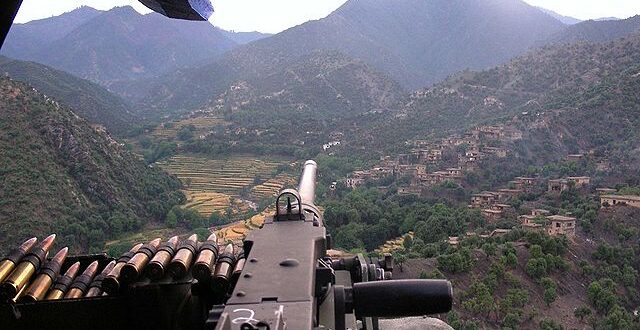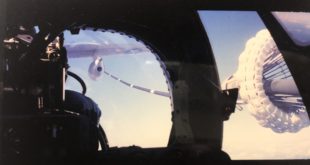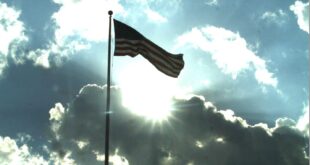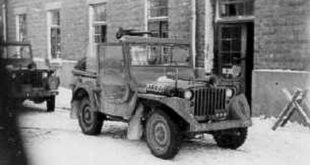by Brendan O ‘Byrne, The War Horse
A small line of people formed in front of the stage; some of them offered a handshake or a thank you, a few wanted to tell me a story about their own experience, and others asked a question or two. An older woman approached alongside a tall man who hunched at the shoulders and wore a beard that hid any expression. They both wore casual clothing. Light blue specks of splattered paint polka-dotted her pair of faded jeans. She wore a light-colored fleece and thick-framed reading glasses. She had aged kindly. The corners of her eyes and mouth wrinkled to show years of smiles and laughter. It seemed like some of those small lines were damp. Gray streaks highlighted her black hair. She carried a copy of War, by Sebastian Junger, with my face on the cover staring out at nothing. She’d tucked the book under her arm to keep both her hands free to grasp mine.
“I just wanted to thank you for your service and your honesty up there on stage today,” she said as she took my hand with both of hers while maintaining direct eye contact. She wore a small, sad smile and didn’t blink. “The fighting you boys did for … us … ” Her voice trailed off as she tried to find words. “Well, no one should have to go through what you and your friends did.” It humbled me into awkwardness for my experience to be honored by my elders. I quickly thanked her as I studied my dress shoes. I may have even told her it wasn’t so bad out there just to make her feel better. I was aware that she was old enough to have possibly said the same words 50 years earlier to an entirely different group of returning veterans, maybe even to the man standing beside her. “It would be an honor if you could sign this,” releasing my hands and untucking the copy of Battle Company 2-503rd’s story.
She made small talk about my speech and said she’d watched the documentary, “Restrepo,” as I signed my name underneath the big block letters of WAR. “I have to admit, from the movie, I thought you’d be bigger.”
I finished signing the book and handed it back while thinking of how to respond. Her kind eyes told me no harm was intended, it was just an observation, yet I wanted to defend myself. I wanted to tell her that the bigger the guy, the bigger the target. I wanted to tell her how the men who could walk like goats through the Hindu Kush mountains with 100 pounds on their backs were shorter than her, which I guessed to be just a few inches over five feet. I bit my tongue when I began to tell her that “Restrepo” wasn’t a movie and there were no actors cast for the part.
My emotions in check, I told her that most of the men I had served with were no bigger than me. I added, politely, that the legendary Spartans averaged five-foot-six.” With more people in line behind her, we said our quick goodbyes.
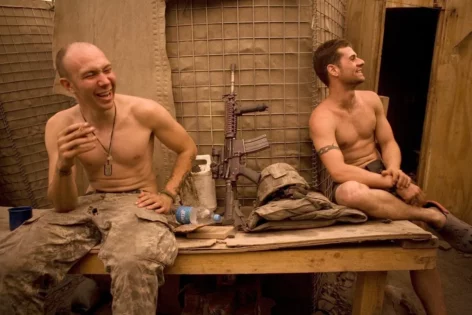
Outpost Restrepo – the outpost is the focus of the documentary RESTREPO by Tim Hetherington and Sebastian Junger.
But her observation bugged me the rest of the day, and I couldn’t understand why. It bugged me so much that I began my next speech by asking the audience, “By a show of hands, who thought I would be bigger?”
Between the chuckles, dozens of hands raised. I laughed with them.
Around this time, 2013, I was speaking regularly around the country about my combat deployment and the journey back home to a range of people: veterans, college students, mental health professionals, and anyone else who would listen.
After the encounter with the woman, I began each speech with that question and received the same response. At the end of each speech, the little line formed with the same kind of questions and the same kind of praise, “Your friends and you are our country’s heroes.” Or something very similar.
The almost universal reactions, observations, and questions from the audiences exposed a misconception in our country about veterans, and more broadly, about how we define “hero.” It wasn’t just the audiences that were confused about veterans and heroes. I was, too.
I had strong mixed emotions about what service to my country meant to me. I served six years in the Army, and in May 2007, I deployed with the 173rd Airborne Brigade to the Korengal Valley, Afghanistan, for 15 months. I lived those long, hard months with my own well-being and needs second to those of the group. That is the mentality in combat; it is always “we.”
I was and am proud that I served honorably.
Yet, at the end of our deployment when a Bronze Star was given to all the men who had served the full 15 months, to all the men I had fought alongside for 15 months, I was given a lesser award. An Army Commendation Medal. There was no explanation why. I have repeatedly asked my former leaders for a reason, but the closest thing to an answer cast blame on Army bureaucracy.
I didn’t care about the award itself, I cared about what the award represented: the Army recognizing the sacrifices and honoring the job we did. I was there doing the same job and sacrificing the same as everyone else, but when the Army recognized me with a lesser award, it effectively told me that my service wasn’t equal to theirs. It shattered my idea of what my service meant to me and to the Army I’d fought for. I felt betrayed, making my last few months of service more miserable than any war could.
I left the military in December 2008 with an honorable discharge and a lot of questions about what my service meant to me, the Army, and my country. It helped me to see that the crowds I spoke to were filled with a lot of the same kind of questions.
“A man can stand here and put all of America behind him.” –David Thoreau on Provincetown
A couple of years after finding out I was too small to be me, I was living on the eastern edge of the U.S.A. in Provincetown, Cape Cod. The small coastal town, as old as America’s story, was port for the Mayflower before the ship continued west to mainland Plymouth, Massachusetts. Nowadays, the visitors come to Provincetown by road rather than by sea. Provincetown is at the end of the 60-mile-long island, which draws two distinct types of people to the small town by the sea: ones who are incredibly lost or ones who have made the choice to be at the terminal point of a 60-mile island.
I was both as I dealt with a failed marriage, coped with the death of my father who’d died a year after my return from war, and tried to get a handle on a crippling alcohol problem, all while trying to find meaning in my now peaceful life. With combat’s constant deadly threat, to be alive and keep each other alive is meaning enough. Without that pressure, meaning became harder to define. While living in Provincetown and dealing with those issues, I continued to search how best to honor my military service, which had become harder to do as I struggled to reconcile being called a hero by the public, knowing what the Army thought of my service. I didn’t know who was right or if they were both wrong.
I was living illegally inside of an old, bare building that had been a ship-refitting wharf until a bunch of returning WWI veterans who wanted to make art and hang out with each other bought it and turned it into an artist club. They’d hardly changed the inside of the building, besides adding a huge fireplace, some long dinner tables, and a pool and billiards table. Nearly 100 years later when I lived there, the walls still hadn’t been insulated. During the winter it became so cold in the building that the top layer of the toilet water froze; I kept a stick next to the toilet to break the ice in order to go to the bathroom. I was given a studio with free room and board in return for taking care of the place and cleaning up the weekly dinner that had been eaten every Saturday since 1916. I slept in the studio’s loft on a worn mattress. From my window, I had a view of the harbor and the boats moored in it. I tried to create beautiful things from chunks of wood and stone; I sculpted the moored boats, figures of nude women, and primitive wooden clubs. It is the most healing place I have ever lived.
I also spent a lot of time on my leaky 25-foot fiberglass sailboat, The Irish Mist. When I lay in the boat’s damp cabin bed, rolling on the protected harbor’s swells, I felt so far from the country I had fought for and the questions about my service and honor, and so far from the feeling that my country and I didn’t know what the word hero actually meant.
My Provincetown P.O. box had a surprise waiting in early 2015, when the town was dead and there was hardly any news at all besides the howling winds of approaching nor’easters. The letter was from Cape Cod’s American Red Cross. Eight years separated the last time I had received a Red Cross message. The previous message found me at the tail end of a fighting season in the Korengal, October 2007, informing me that my younger sister was seriously hurt and that I needed to come home to possibly say my goodbye. Eight years later a dread washed over me as I opened the letter in the post office lobby. Luckily, the envelope contained no threat of possible goodbyes; rather, it shocked me to find a note congratulating me that I would be honored by Cape Cod’s Red Cross as a “Local Veteran Hero.”
I received the news with trepidation.
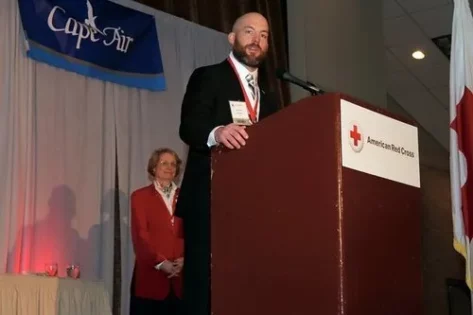
Before I could accept it, I needed to know what they were giving me the award for. If it was for my military service, I didn’t want it. Not that it wouldn’t have been an honor; it would’ve been. But it would have come from the wrong people. The Army should have honored and recognized my service to the country. I hadn’t reconciled those mixed feelings when the Red Cross letter came in the mail, but by that point I no longer wanted any award for the violence of war.
The Red Cross award started unraveling years of confusion for me about why being called a hero for my service hurt instead of feeling good. That woman with the book tucked under her arm, and all the ones who followed her, the audiences, and the country in general had a perception of me and my service. They thought I should be bigger, and they thought what I did overseas had made me a hero. On the other side of the spectrum was the Army, to whom I was just another number.
But to the local Red Cross, and my community, I was more. Through phone calls and emails with a Red Cross representative, I was relieved to learn they didn’t want to honor my military service directly. Instead, they wanted to honor my honest speeches about war and homecoming, the volunteer work I’d done with returning veterans, and the peace I worked toward in myself and my community.
The award helped me clarify what a real veteran hero looks like and what it takes to become one. Serving honorably during combat, I’ve come to believe, is only the beginning. The next step starts when you return home, bringing with you the lessons you learned. In war, I learned that the most human thing we can do is put our own needs, wants, and ego second to the community we live in. The fallen in war have learned combat’s most profound lesson, and their deathly silence demands that we learn the cost of war. The living have valuable lessons about war’s toll as well, though, and I’ve hardly been asked about mine.
It finally clicked as I was writing my speech for the award ceremony that I hadn’t served the Army; I had served my country, the United States of America. To honor my own contribution, I’ve started taking my own advice and reminding myself that my service isn’t over yet. What I have learned is that I don’t want to be recognized and honored only for my contribution in war. We veterans have so much more to give and teach our country than just what we did overseas. To honor our service, civilians who haven’t served need to ask what we’ve learned, and veterans need to speak.
Brendan O’Byrne is an Army veteran who served with the 173rd as an infantry sergeant in the Korengal Valley, Afghanistan. Since being home, he has worked to understand what it means to serve. O’Byrne uses speeches and writing to convey his war and homecoming story.
Editors Note: This article first appeared on The War Horse, an award-winning nonprofit news organization educating the public on military service.
 Soldier of Fortune Magazine The Journal of Professional Adventurers
Soldier of Fortune Magazine The Journal of Professional Adventurers


